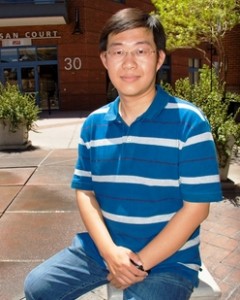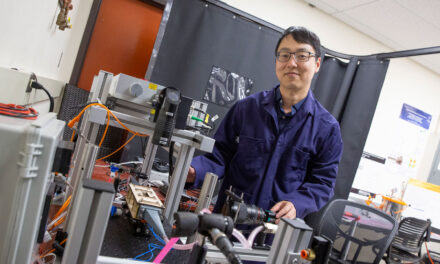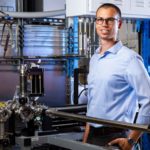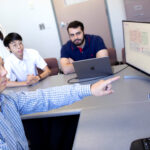
China recognizes achievements of engineering student
Posted: June 18, 2010

ASU’s Kai He is one of fewer than 20 doctoral students in the Southwest to receive the Chinese Government Award for Outstanding Self-Financed Students Abroad. Photo by: Blaine Coury
ASU’s Kai He is one of fewer than 20 doctoral students in the Southwest to receive the Chinese Government Award for Outstanding Self-Financed Students Abroad.
The award recognizes top-performing Chinese students throughout the world studying in research-based doctoral fields.
He is studying to earn a doctorate degree in materials science and engineering in the School for the Engineering of Matter, Transport and Energy, a part of ASU’s Ira A. Fulton Schools of Engineering.
Nominees for the award are evaluated during three rounds of judging by experts in a student’s field of study. Winners are selected based on academic merit and research achievements, and approved by China’s Ministry of Education.
He has published research papers in leading science and engineering, including a cover article in the prestigious journal Applied Physics Letters.
He won a best student research paper award at a major conference on magnetics held by the Institute for Electrical and Electronics Engineers (IEEE), and was an invited presenter at an international Magnetism and Magnetic Materials Conference organized by IEEE and the American Institute of Physics.
He was presented the Students Aboard award recently at the offices of the Consulate General of the People’s Republic of China in Los Angeles. It included a $5,000 fellowship prize.
He, who grew up in the Chinese province of Hebei, studied at the Harbin Institute in Technology in China before coming to ASU in 2006.
He says he was invited to attend graduate schools at several leading U.S. universities, but chose ASU because of its international reputation in the field of electron microscopy.
His work focuses on transmission electron microscopy techniques, particularly the study of electron holography on magnetic materials.
In that area, scientists and engineers conduct research on the fundamental characteristics of materials behavior to discover how materials can best be applied to improving existing devices and developing new devices.
The next generations of advanced recording devices, for instance, will result from this area of research, He said.
His studies at ASU are supervised by David J. Smith, Regents’ Professor in physics, and Martha R. McCartney, physics professor.



































